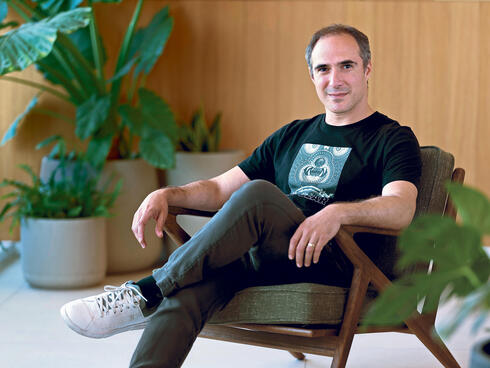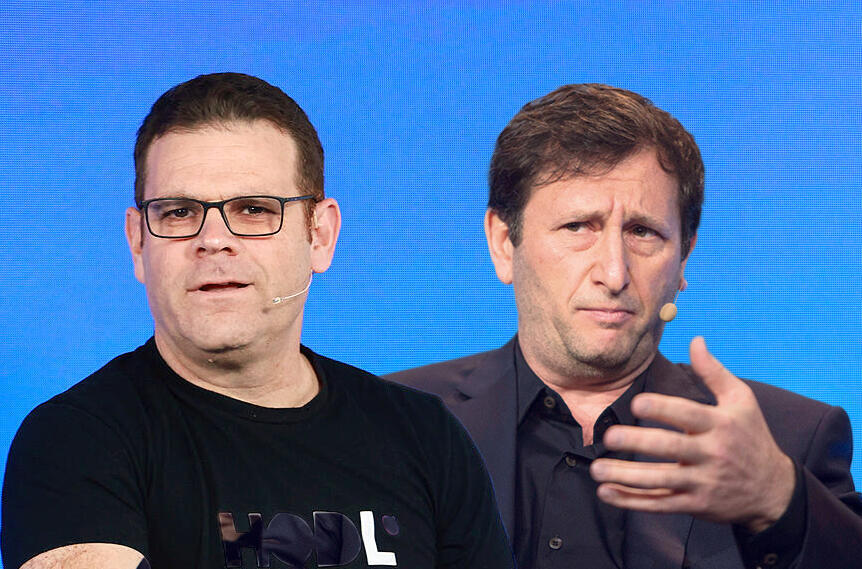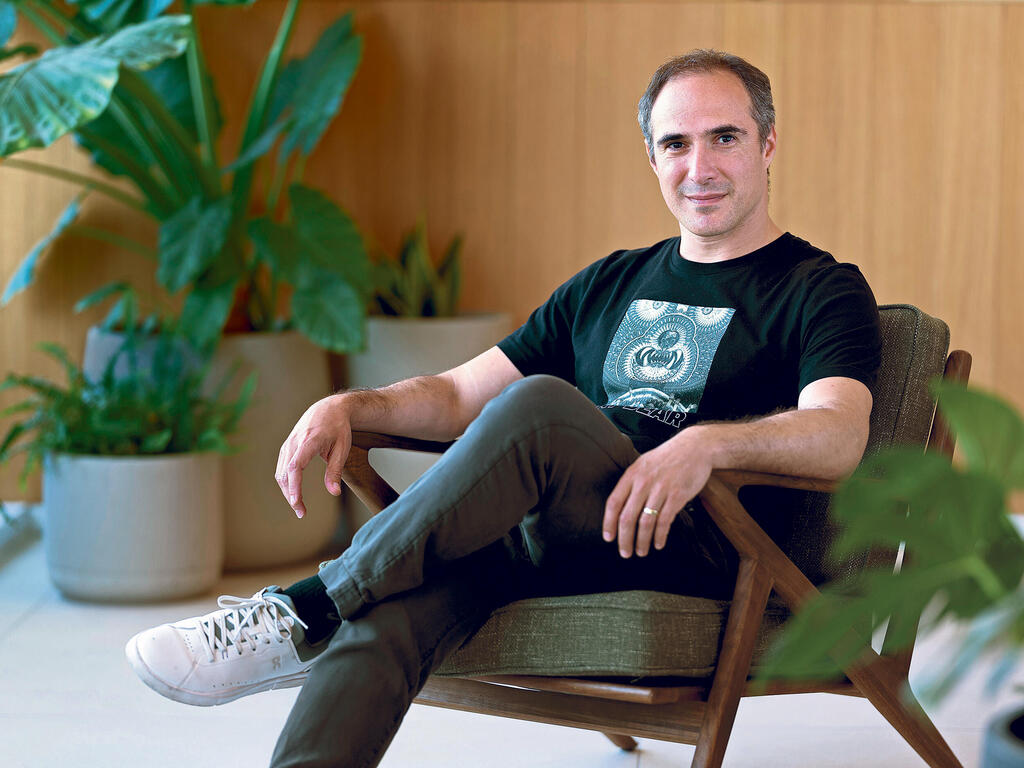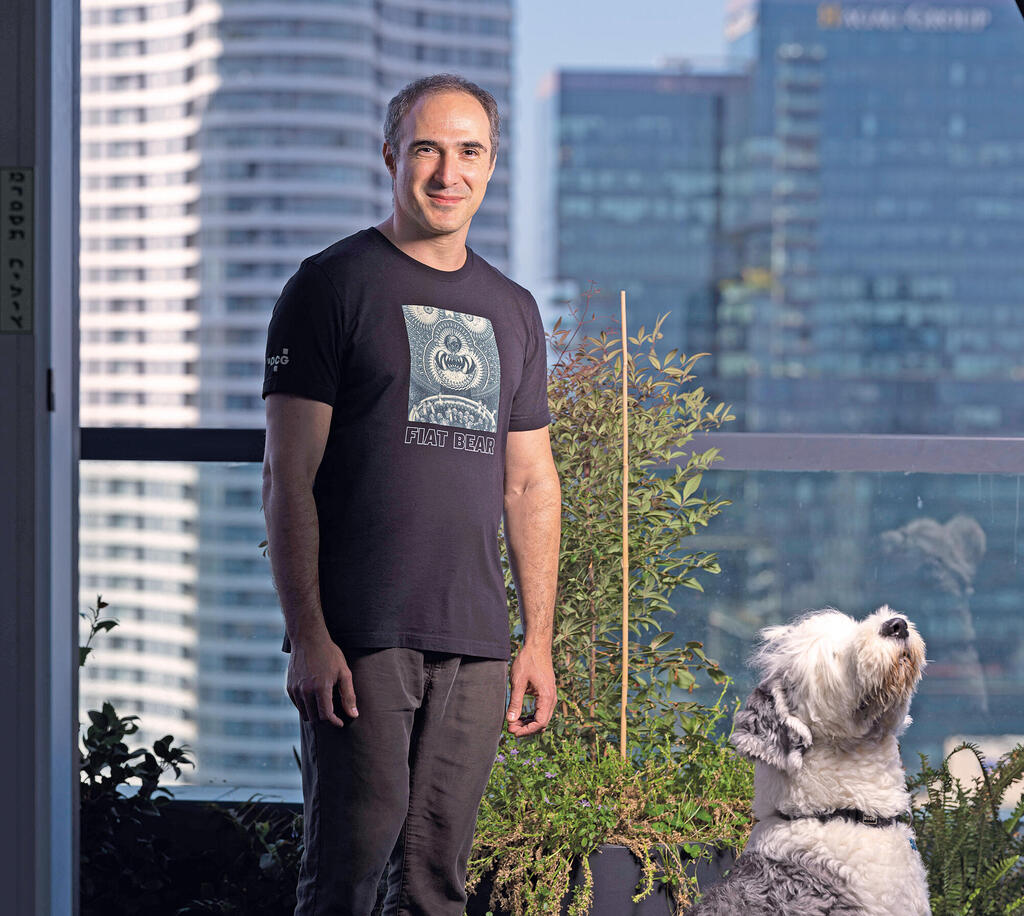
Interview
“So, Celsius collapsed. Lehman also collapsed and the economy didn't stop"
From his perch in the heart of the crypto world, Michael Shaulov, CEO of Fireblocks, looks at the collapse of digital currencies - and is not moved. In an exclusive interview, the man who knows the entire industry personally explains why the "crypto winter" is unfounded hysteria, where the regulator failed in the Celsius affair, and why the U.S. Congress is consulting him on how to fix the industry
A hurricane - this is the only way to define the period that has passed since our previous interview with Michael Shaulov, the CEO of Fireblocks, which develops a platform for the secure storage of cryptocurrencies and the execution of blockchain transactions. We conducted that interview in January 2022 to mark the completion of the company’s Series E funding round, which gave Fireblocks a value of $8 billion - three times what it was just six months earlier, and a value that made the company the third largest startup in Israel. At the time, the crypto market was experiencing minor blows, with declines in crypto values (which returned and recovered in March) and some issues with regulators. But very few anticipated the perfect storm that was brewing on the horizon.
It started in May with the collapse of Terra, which was marketed as a "stablecoin", with a value pegged to the value of the dollar, but crashed by 60% within a day and was later wiped out, in a move that sent massive shock waves through the crypto market. This continued in June when Israeli-founded company Celsius, which developed a platform for providing and receiving loans in cryptocurrencies, was exposed as having taken too bold bets on customers' funds, and after experiencing a spate of withdrawals blocked accounts. A month later, the company already filed a request for protection against creditors in the United States, which discovered that the company has a $1.2 billion hole in the balance sheet, and 300,000 creditors to whom it owes $4.7 billion (some of the coins, by the way, are still in wallets sitting on the Fireblocks platform). Later it was the hedge fund 3AC (Three Arrows Capital), whose sizable investments in Terra left it in total ruin, and whose owners, Kyle Davies and Su Zhu, ran from their creditors and are now in hiding. The domino effect from the collapse of 3AC soon resulted in the bankruptcy of Voyager, a crypto trading and lending platform, which lent 3AC about $650 million.
This dramatic sequence of events made it clear to investors that crypto is not a new type of asset, but another type of security, which led to a general collapse: the total value of crypto assets, which at the end of 2021 had soared to a peak of more than $3 trillion, shrank to less than a trillion. Along the way, a great deal of the money of the small investors who were tempted by the new bet evaporated. As we said already, it was like a hurricane.
Exactly seven months after Shaulov's interview with Calcalist we met again, this time at Fireblocks’ new offices on the 25th floor of the Acro Tower in Tel Aviv. I reminded Shaulov that in our previous interview, he said, "The financial world doesn't like to remember this, but what almost dismantled the global financial system in 2008 was a bank, not a crypto company. It was called Lehman Brothers." Since then, the world of crypto and blockchain has experienced its Lehman Brothers moment, and has proven to be not very immune to the usual ills of the financial industry—and perhaps even less immune.
"I've been thinking about it a lot lately," admits Shaulov (39). "Financial history repeats itself: 3AC are like LTCM (a hedge fund founded in the 1990’s which made huge profits, but was overleveraged and collapsed in 1998), where there were a bunch of crooks who made wild currency bets and almost collapsed several economies. And Celsius are the Lehman Brothers of today: there, too, the collapse came because of a desire to keep up with the competition and get more and more clients, which pushed risk management beyond the reasonable limits of the sector."
Celsius' headquarters were in Great Britain, but after they refused to grant the company a license there, the operations of the headquarters were transferred to the United States. Also there some states did not give them a license, because their type of activity did not meet the rules of the U.S. SEC.
"Specifically, with regard to Celsius, the regulator didn't act fast enough," admits Shaulov, despite the fact that Celsius is a significant client of his. "The American regulator quickly caught BlockFi, a direct competitor of Celsius that does exactly the same thing. They also lost $600 million in one trade. BlockFi's last private fundraising was at a value of $4.5 billion, and now there is talk of selling the company for $15 million. But the end of the story is different: BlockFi's customers were not harmed like Celsius customers, because the regulator caught BlockFi in time and ordered it to define its investment policy and the method of risk management. They didn't have time to reach Celsius."
"Celsius is not the only one, the entire industry has neglected its risk management"
What exactly did Celsius do? The company was founded in 2018 by Alex Mashinsky, a former Israeli living in the United States, and Daniel Leon, who returned to Israel and was responsible for local development activities. The idea, as defined by the two founders, was to be the banking institution of the future. Instead of the lousy interest rates given by the banking system while charging countless fees, Celsius would provide a return (which was never officially defined as interest) on the deposit of the cryptocurrencies on its platform. The company used the customers' crypto to provide loans to other players, and in return paid the lenders weekly interest that sometimes reached 17% on the deposit. In the active Twitter account the company maintained, Celsius declared, paraphrasing the well-known quote, that "the only things that are certain in life are death, taxes - and the weekly payment from Celsius."
How did Celsius produce the yield? It adopted bold trading strategies, such as are also adopted by aggressive Nostro players in the capital market. It's just that Nostro players are not obligated to provide a return to their clients, but can lose as much as they want, because it's their money and not someone else's. At its peak, the volume of deposits in Celsius reached $28 billion, and the company provided services to 1.7 million customers. But as the murmurs, mainly on Twitter, began to grow regarding the fact that Celesius was not a banking institution that would certainly be able to return the deposited coins to its customers, the more and more customers asked to withdraw their coins from the company. This created the effect that scares every bank around the world - a bank run, and Celsius had to freeze the assets of all customers in June. The American "Mrs. Smith” discovered to her astonishment that she could not withdraw her coins from the account - let alone receive the annuity - until an unknown date. She may even never see her savings again.
"I know the people at Celsius very well - Alex, Daniel and Roni (Cohen-Pavon, Chief Revenue Officer)," says Shaulov. "They are not bad people, they did not plan to deceive the public, they did not want to take the money for themselves. They were, and still are, entrepreneurs with a vision who tried to realize it. What happened is that the competition in the field became too aggressive: every day companies emerged that decided to do exactly what they did, and this led to everyone abandoning their risk management, trying to guarantee customers the pot of gold at the end of the rainbow. At first they promised customers 3%, then 5% and 6% and after that 10%, and pursued super-aggressive trading strategies."
3 View gallery


Celsius co-founders Daniel Leon (left) and Alex Mashinsky.
(Photo: Bloomberg and Tal Shahar)
What’s the technology behind this? This method works as long as the market goes up, but once it changes direction you can no longer cover the losses. It is not innovative, but very ancient: it is called a pyramid.
"This is financial technology. How is it different from a hedge fund or an algo-trading company like Israel’s Final, which has been very successful for years? Celsius was also sophisticated, and you can see it in their trading strategies.
"The thing is, if these companies were to act in the same way with traditional, recognized and regulated securities, they would immediately be prohibited from marketing the products to the general public, and limited only to ‘accredited investors' on the assumption that if you have millions, burn them as you like. But since these companies were operating in crypto, the regulator was not there to define the boundaries of the sector and also who is allowed to market it. It's not that they didn't have risk management; Celsius had very serious people running it, including from Bank of America. But the resulting competition pushed them to the edge."
You are repeatedly removing the responsibility from the Celsius executives. You said that the competition pushed them to take unnecessary risks, that the regulator fell asleep on his watch. It's very convenient, but there are those who would define what Celsius did as a fraud.
"What happened to Celsius is exactly what happened to Lehman Brothers, and in the case of Lehman no one claimed that they were crooks or that there was fraud here, but that excessive risks were taken.
"If you're looking for crooks, then for me the worst event, which is plain fraud, is the collapse of 3AC. It's not someone who built a genius algorithm that got out of control, as happened with the Terra project (where the peg to the dollar was done through an algorithm, and not through holding real dollars like in real stablecoins), and it's also not someone the market turned against, like with Celsius. I know the 3AC people, they were even among the first investors in Fireblocks, with a small check of several tens of thousands of dollars, but they left a long time ago. They ran the fund very successfully from 2013, just printing insane amounts of money, but were deeply invested in Terra when it all blew up. From there they started making false representations to get out of it, and that's how they also ended up in protection from creditors with a hole of billions of dollars."
"My job is to secure funds, not detect fraud"
The new situation in the industry has been dubbed "crypto winter", a definition Shaulov strongly rejects. "There is no crypto winter. For me, winter is what happened in 2018, when we started the company," he refers to the collapse of digital currencies that year. "All trust in the field collapsed, people who were involved in crypto left and said it simply wouldn't happen, companies closed. What's happening now is that 10% of the companies have been moderately to severely damaged, because their model does not support bitcoin at a price of less than $21,000. It's not very different from what you see horizontally in high-tech - there are many unprofitable companies, and they need to cut back. But unlike 2018, this time there are more positive signs: all the people who worked in these companies, like Celsius or Voyager, and also many people from outside, are remaining in the industry, coming to us or starting their own companies."
The entrepreneurs may want to establish startups, but the confidence of the general public has been severely shaken over the past summer.
"The name 'crypto' doesn't have much meaning," Shaulov drops a bombshell. "Bitcoin is an interesting underlying asset, maybe a type of gold, but Bitcoin is the only cryptocurrency that can become an asset. Everything else, like Ethereum, Solana, Polkadot — they're just like the little paper slip you take out to pay for lunch at the office. The competition between them is who will do it faster and more securely.
"That's also where the regulatory problem arose in recent years, and the regulator simply fell asleep on duty. We are now working with many regulators. A month and a half ago they invited me and my team to the Congress in Washington to get our opinion as experts in the field regarding the required directions in regulation. They perceive us as a responsible and expert player. We also have a background of being people who built cybersecurity companies in the past, and as those who come from this industry, they perceive us as different from the financiers in the crypto industry."
What woke up the Americans - even if it was late?
"In Israel, the story of Celsius made a lot of noise, but in the United States the watershed moment was actually Terra. After this red line was crossed, the regulators could no longer ignore it. Terra sold people a promise that it was a stable currency like the dollar, when in reality there were no dollars behind it, but an algorithm that might work. Companies like Circle, for example, really have a dollar for every deposit, and it's a real 'stablecoin', but Terra decided to call its coin a stablecoin without that being the case, and no one told them it wasn't allowed. It was an experiment conducted without restrictions, and it blew up in everyone's face. How did they allow $40 billion of public money to participate in such an experiment? Innovation should be responsible and involve the regulator in the process.
"I know Do Kwon, the founder of Terra, so I got to talk to him quite a bit. We were one of the first companies to support his technology, at the end of 2019. I met him because I had a client who asked me to meet with them, and he explained the technology to me and how it works. I said ‘I don't understand how it can work’, but I thought I didn't understand because I'm not a finance person."
What happened with Terra is also attributed to having an effect on the fall of Celsius.
"On the contrary, there is an opinion that it was precisely the exit of Celsius from Terra that started the avalanche there. Here, too, you can see an interesting positive side: one of the amazing things is that because everything is done on a blockchain infrastructure, there is a high level of transparency - and this is in contrast to Lehman Brothers, where everything suddenly exploded out of nowhere. Companies that monitor and analyze what is done on the blockchain saw that Celsius has a locked position in smart contracts, and started saying that this position is stuck because there is no liquidity there. Then the rumor started running on Twitter that they haven’t been liquid for six months, and that if you try to withdraw you will not receive the coins.
"This is also one of the biggest mistakes of the Celsius people: they entered positions too openly, and everyone could see their trade. If no one knew, the withdrawal panic would not have occurred. At Lehman Brothers, only the elite knew."
In hindsight, would you still want Celsius as a customer?
"We won't take Iranians or anyone on blacklists, but I'm not in a position to say who's going to succeed with their experiment and who's not. I'm being asked how it is that Fireblocks, which is so responsible, gave Terra a place on its platform, but it's not my job to say what makes sense and what doesn't."
Were there any clients you "fired" following the recent events in crypto?
"No. My job is not to track scams; that's like asking Amazon if they took Celsius off their servers. My job is to make sure that Celsius' customer money is secure. It's there and it's secure. There's a lot of assets there, in the billions, but less than they owe."
"We can run for a decade without fundraising or going public"
Today FireBlocks employs 550 people, of which 300 are based in the development center in Israel. This is one of the fastest growing companies among the Israeli unicorns: last year its revenues grew by 600% to $60 million, and this year it is supposed to triple its revenues - a target that Shaulov hints will not be a problem to conquer, and probably even beat.
And here is a sentence that can only be written after 2021: luckily for Fireblocks, which was established in 2018, it was too young to go public last year. This saved it from the sharp fall in value suffered by its major American competitor Coinbase, which was issued in April 2021 at a value of $86 billion, and is trading today, after it has already recovered, at about $17 billion. Coinbase has 8,000 customers today, several times the number of that of Fireblocks - so even if measured only by this criterion, Fireblocks’ real value is much lower than the $8 billion that the last funding round reflected.
Let's talk about the impact of recent events on Fireblocks itself.
"We have 1,400 customers and about 30% of the market. We are growing according to the plans, recruiting employees, and we currently have something like a hundred open positions. We have most of the money from the last round in the bank, and in the previous quarter we were quite balanced, so we can run the company for even 10 years without raising more or going public."
You claim that the collapse of Celsius, which is your client, did not affect you financially and did not hurt the sentiment towards you. And even though you accepted Celsius as a client, it provided them with a certain seal of approval, thanks to the fact that the regulator trusts you.
"Even GameStop (a chain of computer game stores, whose stock soared at the beginning of 2021 due to a short squeeze and then collapsed) ran on the infrastructure of Nasdaq, and no one complained about Nasdaq, even though people invested in a company that had nothing behind it and lost money. My job is to secure the money in regards to the cyber risks. Why do we pay taxes? So that the regulator will protect us from fraud."
And what are the recent events doing to your investors? You have big names there like Sequoia, General Atlantic, Coatue, Google's investment fund CapitalG, and also the financial giant BNY Mellon. Are these investors as calm as you?
"They are not bothered, they ask me if we want more money. They see that despite everything that has happened in the market, we continue to grow, and it is clear to them that it is not trivial."
Are they willing to give you money at the same valuation or more?
"It's not clear, there is a 'Schrödinger's cat' event here," he mentions a thought experiment in physics, which ends in a box where there is no way to know if what was put into it is still in it. "Anyone who raised funds in the last year and a half and needs to raise now has a problem, because it will be at a lower value. I myself invested in companies that raised in their first round at a value of $80 million after the money," he alludes to the bubble. "If now they want to raise again and they have four clients, who will give this value today?
"In general, I'm trying to understand what's happening in the funding market, but I don't think anyone understands or knows. Even the Goldman Sachs people, who always come and update me on when and how to prepare for the IPO, don't talk about it now, because they have no idea. Everyone is waiting for the dust to settle, or at least for when the Fed will stop raising interest rates. In the meantime, those who don't need to raise, won't raise, and those who have to, their situation is not ideal. Fortunately, I'm in the first group."
So how can you say there is no “crypto winter”?
"It is true that the falls of Celsius and Terra were a defining event in the financial industry, but even after Lehman Brothers the economy did not stop. The story of Terra brought the regulator into the picture, and the easiest issue for the regulator to deal with now is the question of what is a stablecoin. This is regulation that has now entered high gear, and this is a very positive development.
"In crypto we are currently in the midst of the biggest socio-economic experiment in decades. I admit that I do not fully understand the world of NFT - but on the other hand, even when I saw Instagram for the first time I did not understand who would want to scroll through all the photos. Sometimes I think it might be better to pin the Picasso you have on your Twitter profile, because that's where everyone sees you; hardly anyone comes to your house to see the picture hanging on the wall.
"The traditional banks' rush towards the blockchain is also only accelerating. A CEO of one of the largest banks told me recently that he's glad it all collapsed, because it creates a better opportunity for them to enter. I am not allowed to reveal now the breadth of activity that takes place in the world of traditional banking in this area, because of confidentiality agreements, but in 2023 very big things will happen."















